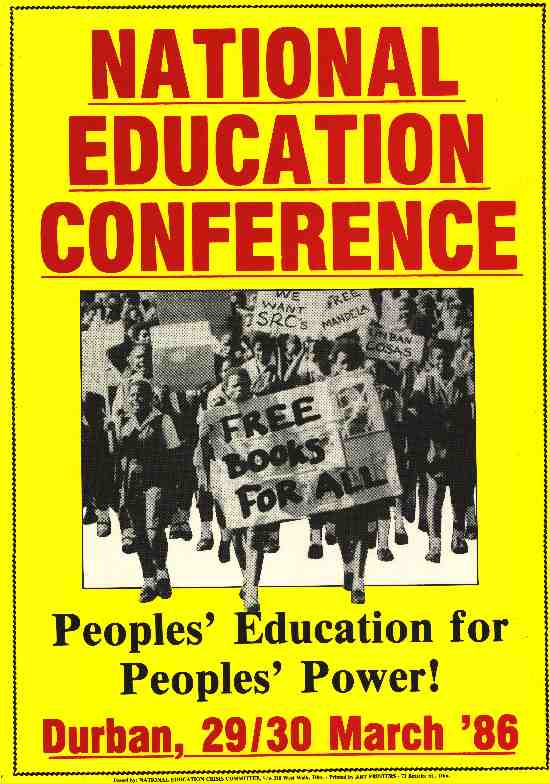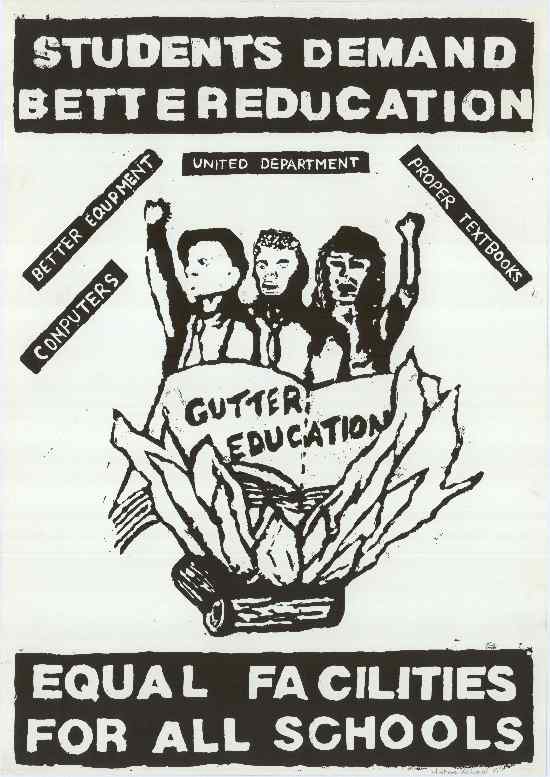In March 2011, the South African History Archive (SAHA) proudly endorsed a Memorandum put forward by the Cape Town-based NGO, Equal Education, outlining minimum norms and standards for school infrastructure and national guidelines on school libraries by 1 April 2011. This Memorandum was presented on Human Rights Day to Dingane Ngobeni, Chief of Staff for the Minister of Basic Education, Angie Motshekga, at a demonstration comprising twenty thousand uniformed learners, teachers , parents, concerned citizens, and members of Equal Education. The Minister had chosen not to attend, despite the urgent call for her to actualize promises made in her June 2010 publication of the ‘National Policy for an Equitable Provision of an Enabling Physical Teaching and Learning Environment.'
, parents, concerned citizens, and members of Equal Education. The Minister had chosen not to attend, despite the urgent call for her to actualize promises made in her June 2010 publication of the ‘National Policy for an Equitable Provision of an Enabling Physical Teaching and Learning Environment.'
This policy emerged out of Section 5A of the South African Schools Act, which specifically details required minimum standards for school infrastructure. Motshekga's policy unequivocally states that the National Norms and Standards are to be developed and fully adopted by the end of March, which forms the end of the 2010/2011 financial year. Equal Education has now put pressure on the Minister to fulfil her promises. The 21 March demonstration has been followed by a ten-day count down to the deadline for the implementation of a minimum standard for equal and quality education, and another march will take place on 31 March 2011.
Equal Education remains committed to addressing the overwhelming appearance of material deprivation in schools around South Africa. According to Conyngham and Isaacs' research report entitled ‘We can't afford not to: costing the provision of functional school libraries in South African public schools', the majority of public schools in South Africa function without libraries or librarians. In a study conducted on the educational crisis in the Eastern Cape, Equal Education revealed that nearly four hundred schools in the province were ‘mud schools'; even the regional School Nutrition Program had been stopped. Equal Education has called on the national Department of Basic Education to deal with regional corruption and financial mismanagement, and to ‘fulfil its constitutional responsibility' by stepping in and building capacity in the region.

This struggle for justice echoes the spirit of protest of a previous generation of school-goers, who were ultimately successful in challenging the might of an intrinsically unjust system. In contemporary South Africa, the nature of the struggle may be different, but the vision remains the same: equal education for all.
Learn more about EE's campaign for a National Policy on School Libraries.
SAHA and education
SAHA remains committed to equal and quality education for all through providing enrichment workshops for both educators and learners on oral history, human rights and heritage education. Between February and March 2011, SAHA ran a series of workshops on human rights education at Constitution Hill.
Learn more about these workshops.
A number of educational resources have been developed to support history educators. These are available for download for free for registered users.
Learn more about our educational resources.
In 2010, SAHA developed a virtual exhibition supporting oral history education in the classroom. The site provides comprehensive and practical steps aimed at helping learners and educators conduct community-based oral history projects, particularly for the Department of Basic Education's Nkosi Albert Luthuli Young Historians' Oral History Competition. The site has been developed using the winning portfolios of learners and educators who have participated in the competition in the past. These are stored in the Department of Basic Education's Nkosi Albert Luthuli Young Historians' Collection (AL3285).
Visit the oral history virtual exhibition.






 , parents, concerned citizens, and members of Equal Education. The Minister had chosen not to attend, despite the urgent call for her to actualize promises made in her June 2010 publication of the
, parents, concerned citizens, and members of Equal Education. The Minister had chosen not to attend, despite the urgent call for her to actualize promises made in her June 2010 publication of the 
